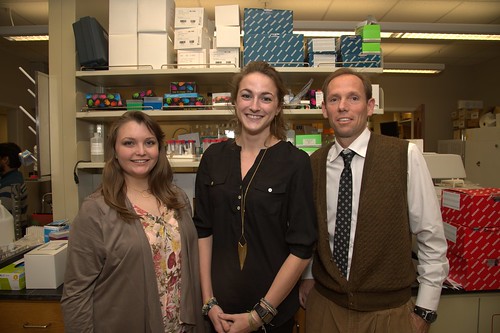Assistant professor, students’ investigation of Western diet presented at Boshell Research Day
Article body
Mike Greene, an assistant professor of nutrition at Auburn University, is understandably concerned about the continued popularity of the Western diet.
Not only is the diet – characterized by the high intake of red meat, refined sugars and saturated fat, and little fiber – quite unbalanced, Greene found that it can play a role in the maladies, or diseases, of the gut, liver, adipose tissue or body fat and the brain.
"I'm concerned about the next generation in our country and for other countries that aspire to become more Westernized," said Greene. "There are health consequences that come with Westernization.
"We very focused on the maladies. It's hard to find any positives associated with consuming this diet."
Greene is one of a number of nutrition researchers at Auburn who presented at Boshell Research Day on Feb. 26. The Boshell Diabetes and Metabolic Diseases Research Program, based in the College of Veterinary Medicine, is a research initiative that seeks to better understand and treat diabetes and metabolic diseases by uniting the efforts of researchers across the university. More than 40 faculty members at Auburn are part of the program.
Greene's research found that a high-fat Western diet, plus sugar water, was shown to induce advanced liver disease in mouse models of obesity. Besides the added calories, the addition of sugar water for mice can represent the high fructose people often include in their diet, such as soda and artificial juices.
"We were very interested in what the sugary water was doing," he said.
The high-fat Western diet with sugar water is already associated with increased cancer risk in humans, Greene said. With a major grant from the Auburn University Research Initiative in Cancer, Greene and Elizabeth Lipke, an associate professor in the Department of Chemical Engineering in the Ginn College of Engineering, will conduct a study focusing specifically on diet and colon cancer.
Isabelle Crouch, an undergraduate Honors College student studying nutrition and dietetics, got involved with Greene's study as part of a research project with the Honors College. For her oral presentation at Boshell Research Day on the use of meal timing aids to reduce the detrimental metabolic effects of a Western Diet, Crouch won second place in the graduate student presentation competition.
By restricting the availability of food for some mice and not for others, Crouch said the meal-timed mice actually lost weight and consumed about the same amount of food as those with unlimited access. The meal-timed mice also didn't consume more sugar water than the other mice to compensate for the food restrictions, she said.
"Our results support the hypothesis that meal timing aids in reducing the detrimental metabolic effects of consuming a high-fat Western diet, even in the presence of added sugar to the drinking water," said Crouch.
Lauren Woodie, a doctoral student in the College of Sciences and Mathematics, presented a poster on the Western diet at Boshell Research Day and won second place in the graduate student poster competition. As part of a Cell and Molecular Biology Fellowship, Woodie spent her first rotation in Greene's lab and is now in a rotation with Professor Vishnu Suppiramaniam in the Department of Drug Discovery and Development in the Harrison School of Pharmacy.
"What we're doing is examining the interaction between diet and immunity and how that affects different parts of the body," she explained. "Specifically, we want to see what happens to an animal with immature B and T cells when they are put on a Western diet."
B and T cells are critical components of the immune system.
"Dr. Greene has already shown that animals without this gene change gain more weight and have worse insulin sensitivity when only on a high-fat diet. So, he wanted to take it one step further and supplement the high-fat diet with a sugar water solution," said Woodie. "His side of the project will focus on the effects on the periphery organs – those other than the brain and spinal cord – while Dr. Vishnu's side focuses on the effects on the brain."
There's still much work to be done before reaching definitive conclusions from this study, but Woodie said diet has been a consistent factor in overall health of animals.
"I think this is a field of research that is not going away anytime soon, especially since there continues to be a rise in obesity and type-2 diabetes rates," she said.
Related Media
Media interested in this story can contact Communications Director Preston Sparks at (334) 844-9999 or preston.sparks@auburn.edu.
Auburn University is a nationally ranked land grant institution recognized for its commitment to world-class scholarship, interdisciplinary research with an elite, top-tier Carnegie R1 classification, life-changing outreach with Carnegie’s Community Engagement designation and an undergraduate education experience second to none. Auburn is home to more than 30,000 students, and its faculty and research partners collaborate to develop and deliver meaningful scholarship, science and technology-based advancements that meet pressing regional, national and global needs. Auburn’s commitment to active student engagement, professional success and public/private partnership drives a growing reputation for outreach and extension that delivers broad economic, health and societal impact.





